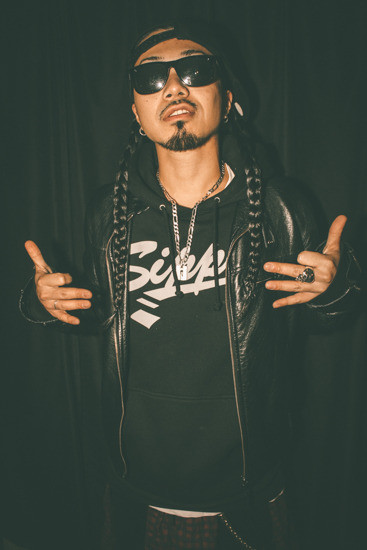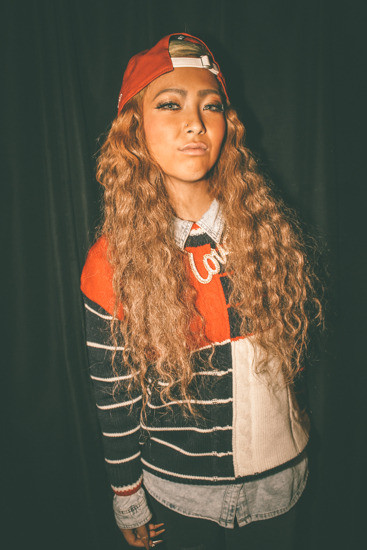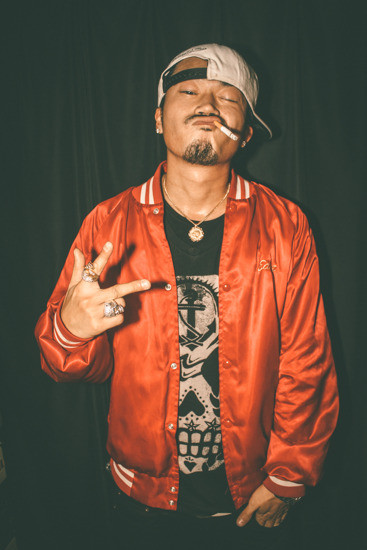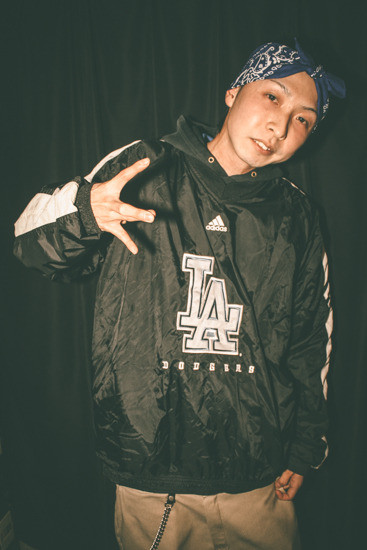Desiré van den Berg: She appeared in a documentary about B-style a couple of years back, which I happened to watch. This is what got me interested in the culture. It took a lot of effort, but I eventually got in touch with her on Facebook, through other B-stylers. I said I wanted to take photos of her, and she actually thought that was pretty cool. It was all a bit of a hassle, though, because Hina and the other B-stylers didn't speak a single word of English. We needed a translator both to make an appointment and at the actual first meeting, too.How does that work in terms of translating rap lyrics?
Hina speaks some English but not fluently. She does like to use some English slang when she speaks Japanese with her B-style friends, like finishing a sentence with "man" or using bad words like "motherfucker" jokingly.I know Japan is full of weird subcultures, but how do you explain this one?
There are things like the Harajuku Girls, which I guess are rather normal but some are complete excesses. B-style is the sort of thing you would find on wtfjapanseriously.com. Hina often goes to New York, and she idolizes America. Japanese TV is full of American films and commercials and that must be a reason, too. She sees America as a kind of promised land.

No. It's pretty small; you don't really see it on the streets. You really have to look for it. According to Hina, it was bigger a couple of years ago—now there are only a few die-hards left in each city. It's definitely not mainstream, and maybe still to small to even call it a subculture.What do B-stylers like Hina mainly do?
Hina, for example, visits a tanning salon every week to darken her skin. I was surprised these tanning salons even exist, because in Japan it is a classic beauty ideal to have your skin be as pale as possible.Just to be clear: Hina is 100 percent Japanese and naturally has pale skin. She is only dark because of the sunbed and the use of really dark foundation. B-stylers also listen to hip-hop, and visit special African hair salons to get braids or curly hair. These salons are usually found in Tokyo's ghettos and are run by small African communities. Hina wears colored contact lenses: they are a lighter shade of brown to make her eyes seem bigger.

There are special B-style events where primarily Japanese youth breakdance and dance to hip-hop and R&B. Even though the event attracts mostly Japanese people, you hear a lot of typical slang. I went to one of those events and had the feeling that all of a sudden everything had come together. I got the sense that it's a bigger group than I'd imagined.
Apparently not in Japan, but in most comments underneath videos on YouTube you see fierce reactions. Many seem to feel the Afro-American typecasting is all wrong. Hina and other B-stylers are not really aware of this.

When I was in Japan I realized that it's considered really impolite to stare. You see the weirdest people on the streets, but no one stares, not like the way they can in the Netherlands, where I'm from. It's easier for people to be who they want to be. Hina's parents are fine with it. Her mom sees it as a phase that will pass. Even though many Japanese feel right at home in the mass, it is still a land of extremes, which manage to coexist rather well.You can see more of Desiré's work here.
Hina in her hometown Tokyo.
Sale at Baby Shoop, a boutique aimed at B-stylers.
A former B-styler shows a photo she took with her friend in a "purikura" (Japanese photo booth), from when she used to follow B-style. Her nickname was "Big Mama."
Rappers at a B-style event in Shibuya, Tokyo.



Lookbooks of one of the few Japanese brands for B-stylers. Kendrick Lamar's famous line "bitch don't kill my vibe" is printed on many items throughout the collection.
Baby Shoop's tagline "Black for life" printed on a T-shirt

The Youtube video on B-style that Hina appeared in got so many views that it resulted in people recognizing her in the US during her vacation